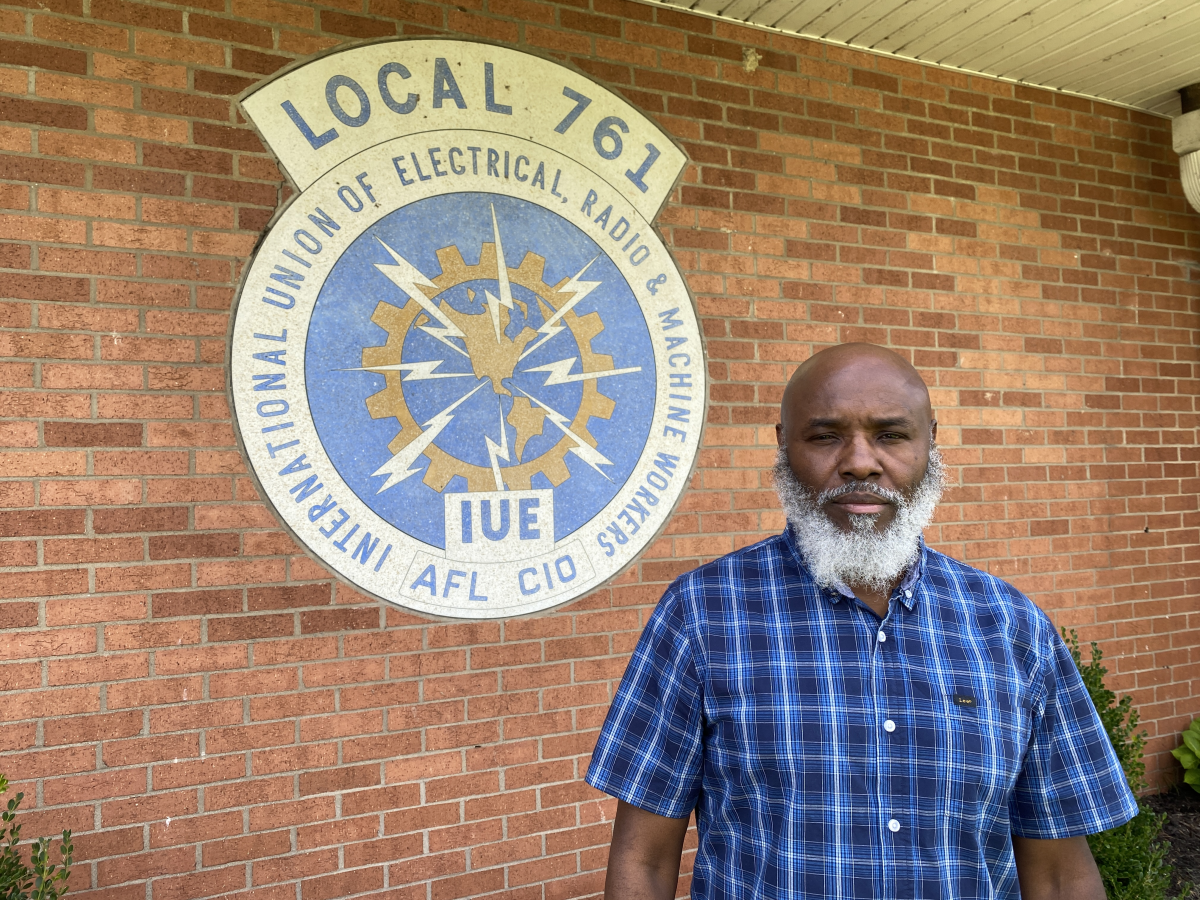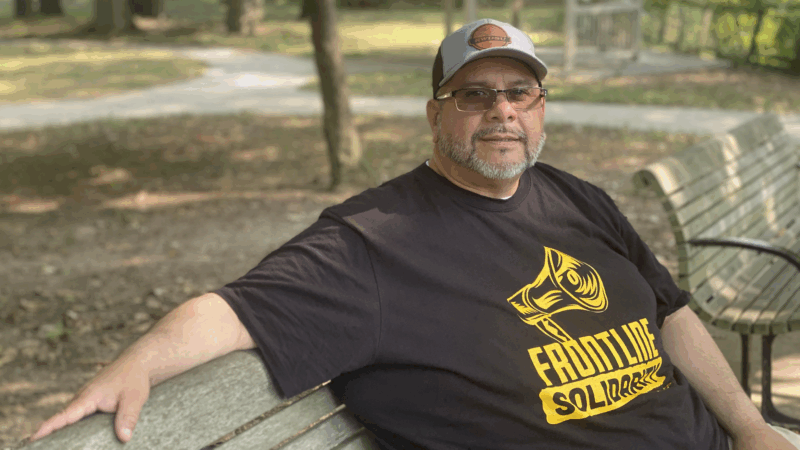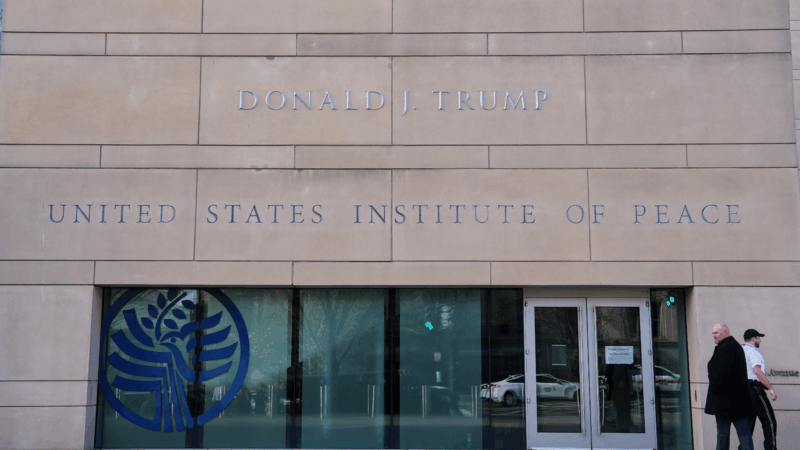Factories are losing immigrant workers, stressing those who remain
LOUISVILLE, Ky. – Jaelin Carpenter was stressed. Four people on her team of 26 at GE Appliances had learned that their immigration status had changed.
Under former President Biden, they’d been allowed to stay and work in the U.S. for two years, protected by a program set up to help people fleeing humanitarian crises back home. But the Trump administration abruptly canceled that program, revoking their legal status and their authorization to work. Carpenter fielded call after call from her panicked coworkers.
“They were calling me asking me if they’re on the run. ‘Does this mean I’m getting deported today?'” she recalls them asking.
As a team leader on a washing machine line and a union shop steward for IUE-CWA Local 83761, Carpenter was used to fielding all kinds of questions at work. But she wasn’t prepared for this.
Her coworkers were desperate for answers. Carpenter had none. That tore her down, she says.

Carpenter says the four team members were doing some of the most difficult tasks on the line, installing the hoses on the washers as well as affixing the platforms that hold the motors.
“These are people who are on critical jobs,” she says.
And suddenly, they were gone.
Sudden departures leave companies with holes
In recent months, immigrants working in manufacturing, food production and other industries have lost their jobs due to President Trump’s immigration policies — not as a result of immigration raids, but because Trump ended Biden-era programs that had provided them temporary permission to remain in the U.S. and get jobs.
Those affected include more than a half-million immigrants from Cuba, Haiti, Nicaragua and Venezuela who had been granted humanitarian parole for two years through a program known as CHNV — an acronym for the countries it covered. The changes also affect close to one million immigrants who were allowed into the U.S. after securing appointments at the U.S.-Mexico border via a U.S. government app.
Those programs were part of Biden’s efforts to create a safe, orderly process at the border for those fleeing war, violence or political unrest. The Trump administration says they achieved the opposite.
“Programs like CHNV were abused to admit hundreds of thousands of poorly vetted illegal aliens. It was exploited by bad actors, undercut American workers, and encouraged more illegal immigration,” wrote White House spokesperson Abigail Jackson in a statement.
Trump’s cancellation of those programs has been challenged in court, delaying his efforts to get people to leave immediately. Also facing legal challenges is Trump’s cancellation of Temporary Protected Status for people from a number of countries. Those protections, in some cases granted decades ago, were aimed at providing temporary relief for people escaping unsafe conditions due to war or environmental disasters. The Trump administration argues those conditions have long passed, despite ongoing violence and instability in some places.
Even with the legal battles still unfolding, the reversal in immigration policies has left employers with holes to fill as they’ve scrambled to remove from their payrolls those no longer authorized to work or even stay in the U.S.
“This is a new area for us. We’ve certainly consulted with other people just to understand — what does this mean? How are we supposed to do this?” says Julie Wood, head of corporate communications for GE Appliances. To date, Wood says the company has seen 148 employees lose their eligibility to work.

Wood says the departures have not caused a major disruption at the plant, which employs some 5,000 production workers across five buildings. The company always keeps replacement workers on hand to fill in for absences, and Wood says they’ve added to that pool during the current uncertainty.
Still, the sudden exits are felt deeply in some parts of the appliance park. For Carpenter, training new people has been taxing. She worries mistakes will be made. She’s uneasy, wondering who’s going to be on the job on any given day.
“I can’t control it,” she says. “Nothing I can do about it.”
A vow to protect American jobs
During the presidential campaign last fall, Trump warned American workers that Biden’s immigration policies had cost them.
“What’s going on with African American workers and with Hispanic in particular — just taking your jobs. They’re taking your jobs. Every job produced in this country over the last two years has gone to illegal aliens,” Trump told a crowd in Wilmington, N.C., last September. “What we’re doing to this country is so sad.”
But Tom Torres doesn’t see things that way.
A mechanic for Kraft Heinz in Holland, Mich., Torres says immigrants have long played key roles at the plant, which is best known for making pickles. Born in Michigan to Mexican farmworkers and raised in Texas, Torres grew up making the annual summer migration from Texas to Michigan to pick berries and other crops. He sees in his immigrant coworkers the same work ethic he saw in his parents.

“Whatever you give them, they’ll do,” he says, whether it’s dumping bottles, sweeping the floors or sorting pickles, hunched over the conveyor all day. “No complaints.”
Under Trump, some of Torres’ coworkers are now gone, stripped of their authorization to work.
Kraft Heinz says six employees have been affected by Trump’s immigration policies. The Retail, Wholesale and Department Store Union, which represents about 270 employees at the plant in Holland, believes it’s more.
Torres, who serves as the local union president, says he’s sat in on more than a dozen human resources meetings where employees have been told they’re no longer eligible to work. He’s watched people in the company struggle to deliver the message.
“Just tears in their eyes,” he says, adding that it’s been difficult for him, too. “It’s killing me, because I’m watching them walk out. I know these people because I work with them every day.”
Chamber of commerce calls for more immigration
Even as companies like Kraft Heinz and GE Appliances maintain they are adequately staffed for now, there are growing concerns across the broader business community that Trump’s immigration policies could create problems in the not-too-distant future.
Greater Louisville Inc., the regional chamber of commerce, has long advocated for more immigration, not less.
“In today’s exceptionally tight labor market, decreased legal immigration has contributed to stifling our economy,” the chamber states in its 2025 Federal Agenda. “American businesses are experiencing significant workforce shortages despite investments in expanding domestic pipelines.”
Shelby Somervell, senior vice president of government affairs for Greater Louisville Inc., was part of a delegation that traveled to Washington, D.C., this summer to lobby for an expansion of legal immigration, among other issues.
“The workforce participation rate in Kentucky is lower,” Somervell says. “Any way that we can fill those jobs legally is what we want to do.”
Filling at least some of them with immigrants appears necessary, given Louisville’s changing demographics. Domestic migration to the region has been down, while international migration is on the rise.
“Louisville metro itself would have lost population last year without international migration,” says Sarah Ehresman, director of labor market intelligence at the workforce development board known as KentuckianaWorks.
She notes some 10,000 Cubans and Haitians settled in the area in the last fiscal year alone. “So it’s definitely an important part of the city’s population growth, and as a result, its workforce,” she says.
Ehresman says manufacturers in particular are going to need workers because of their aging workforce. More than a quarter of the sector’s workers are 55 and older.
Meanwhile, GE Appliances recently announced two new production lines. They’ll need another 800 workers by the year 2027 to build a new front-loading washer and a washer-dryer combo.
Before then, though, the company could lose more workers. Trump has canceled Temporary Protected Status for people from Afghanistan, Venezuela, Honduras, Nicaragua, Haiti and other countries. Although there are legal challenges pending in court, TPS protections have expired or will expire in coming months unless Trump changes his mind and extends them.

Michel Ange Lucas, who builds refrigerators for GE Appliances, says the current February 3 expiration date for TPS for Haitians will leave big gaps at the plant, given how many Haitians work there.
“From Building 1 to Building 5, it’s a lot of us,” says Lucas, who is of Haitian descent but is not a TPS holder.
He thinks for people who had the government’s permission to stay and work in the U.S., what’s happening now is unfair.
“The people is not illegal,” Lucas says. “Politics made them illegal. But they was never illegal.”
Transcript:
JUANA SUMMERS, HOST:
President Trump is trying to remove millions of immigrants from the United States, including many who entered the country lawfully under President Biden and had authorization to work. Court challenges have slowed Trump’s efforts, and still, employers are losing workers as a result. One part of the country that’s welcomed large numbers of immigrants in recent years is feeling the hit. NPR’s Andrea Hsu reports from Louisville, Kentucky.
ANDREA HSU, BYLINE: At the sprawling GE Appliance Park, Julie Wood takes me to see how washers and dryers are made. You have giant stamping presses that turn rolls of steel into familiar parts.
(SOUNDBITE OF MACHINES RUNNING)
JULIE WOOD: The lids and all the different metal pieces that come together.
HSU: On another line, workers move efficiently, getting the parts in place.
WOOD: They’re working on the top of the unit where you’re going to start to put in the controls and the electronics.
HSU: Wood leads corporate communications for GE Appliances. The company has about 5,000 production workers in Louisville. They also make refrigerators and dishwashers here. Like many employers in the region, the Appliance Park draws workers from all over. The union says 20 different languages are spoken here. Wood says they don’t track employees by nationality, but…
WOOD: As long as people are eligible to work, they are welcome to work for us.
HSU: Who’s eligible has gotten narrower in recent months. Trump ended Biden-era programs that allowed more than a million people to enter the country legally and remain here on humanitarian parole. Trump said Biden failed to properly vet people. He’s also railed about immigrants taking American jobs. A young woman from Cuba is among those who was told, you need to leave. NPR agreed not to name her because she fears being targeted by immigration authorities. I asked her, were you surprised?
UNIDENTIFIED PERSON: Yes, very.
HSU: Yes, very. She’d come to the U.S. last summer in search of freedom and financial stability. In January, she landed a job at the appliance park.
UNIDENTIFIED PERSON: (Speaking Spanish).
HSU: “It was a dream,” she said. The job paid well and came with great benefits. Her plan was to send money back home to her family, but then Trump canceled her parole, and by late May, she was out of a job.
UNIDENTIFIED PERSON: (Speaking Spanish).
HSU: She was one of 148 people at GE Appliances who could no longer work because of a change to their immigration status. Julie Wood says that hasn’t caused a major disruption because the company always has extra people on hand to fill in for absences.
WOOD: And as we have been monitoring this situation, we have kept some extra additional people just in case.
HSU: Still, in parts of the plant, the departures have been felt deeply. Jaelin Carpenter is a team leader on a washing machine line. She lost four people on her team of 26.
JAELIN CARPENTER: These are people who are on critical jobs.
HSU: They’re responsible for screwing in the platform that holds the washing machine motor and installing the hose.
CARPENTER: If you don’t do the job correctly, that can flood somebody’s house.
HSU: Carpenter, who’s also a union shop steward, says temporary replacements were brought in, but it’s not the same as having a solid team of people you trust in place.
CARPENTER: It’s a pain when you have to come in and actually worry about it. Like, oh, who’s going to be on the job today?
HSU: Trump says his immigration policies are aimed at protecting American workers. But Louisville has welcomed immigrants, in part because employers need them. Sarah Ehresman is with the workforce development board known as KentuckianaWorks.
SARAH EHRESMAN: It’s interesting, Louisville metro itself would have lost population last year without international migration.
HSU: And Ehresman says manufacturers, especially, are going to continue to need workers, because the ones they have are aging.
EHRESMAN: Twenty-six percent of the sector’s current workforce is ages 55 and older.
HSU: Leaving open the question, who will replace them? Not to mention, GE Appliances has announced new production lines. They’ll need 800 more workers within two years. Now, as for the woman from Cuba we met earlier, well, in a twist of fate, she got rehired a couple weeks ago after receiving new work authorization tied to her application for political asylum. Despite this, she remains on edge.
UNIDENTIFIED PERSON: (Speaking Spanish).
HSU: She says, “everything has changed under this president.”
UNIDENTIFIED PERSON: (Speaking Spanish).
HSU: She says, “one day I have a permit to work. The next day, I open my eyes, and I don’t. One day I might have political asylum. The next day, no, I won’t. You never know,” she says.
Andrea Hsu, NPR News, Louisville, Kentucky.
Iran and the U.S. lean into gunboat diplomacy as nuclear talks hang in balance
Iran and the United States leaned into gunboat diplomacy Thursday, with Tehran holding drills with Russia and the Americans bringing another aircraft carrier closer to the Mideast.
José María Balcázar becomes Peru’s eighth president in a decade
José María Balcázar has become Peru's new interim president, replacing another interim leader who was removed over corruption allegations just four months into his term.
Trump gathers members of Board of Peace for first meeting, with some U.S. allies wary
President Donald Trump will gather Thursday with representatives from more than two dozen countries that have joined his Board of Peace, for a meeting that will focus on the reconstruction of Gaza.
With a win over Sweden, the U.S. men’s hockey team will play for an Olympic medal
A thrilling overtime goal by defenseman Quinn Hughes puts Team USA through to a semifinal game against Slovakia. On the other side of the bracket, Canada had its own close call, but moves on to face Finland.
Zuckerberg grilled about Meta’s strategy to target ‘teens’ and ‘tweens’
The billionaire tech mogul's testimony was part of a landmark social media addiction trial in Los Angeles. The jury's verdict in the case could shape how some 1,600 other pending cases from families and school districts are resolved.
The Trump administration is increasingly trying to criminalize observing ICE
ICE officers often tell people tracking and watching them that they are breaking federal law in doing so, but legal experts say the vast majority of observers are exercising their constitutional rights.







